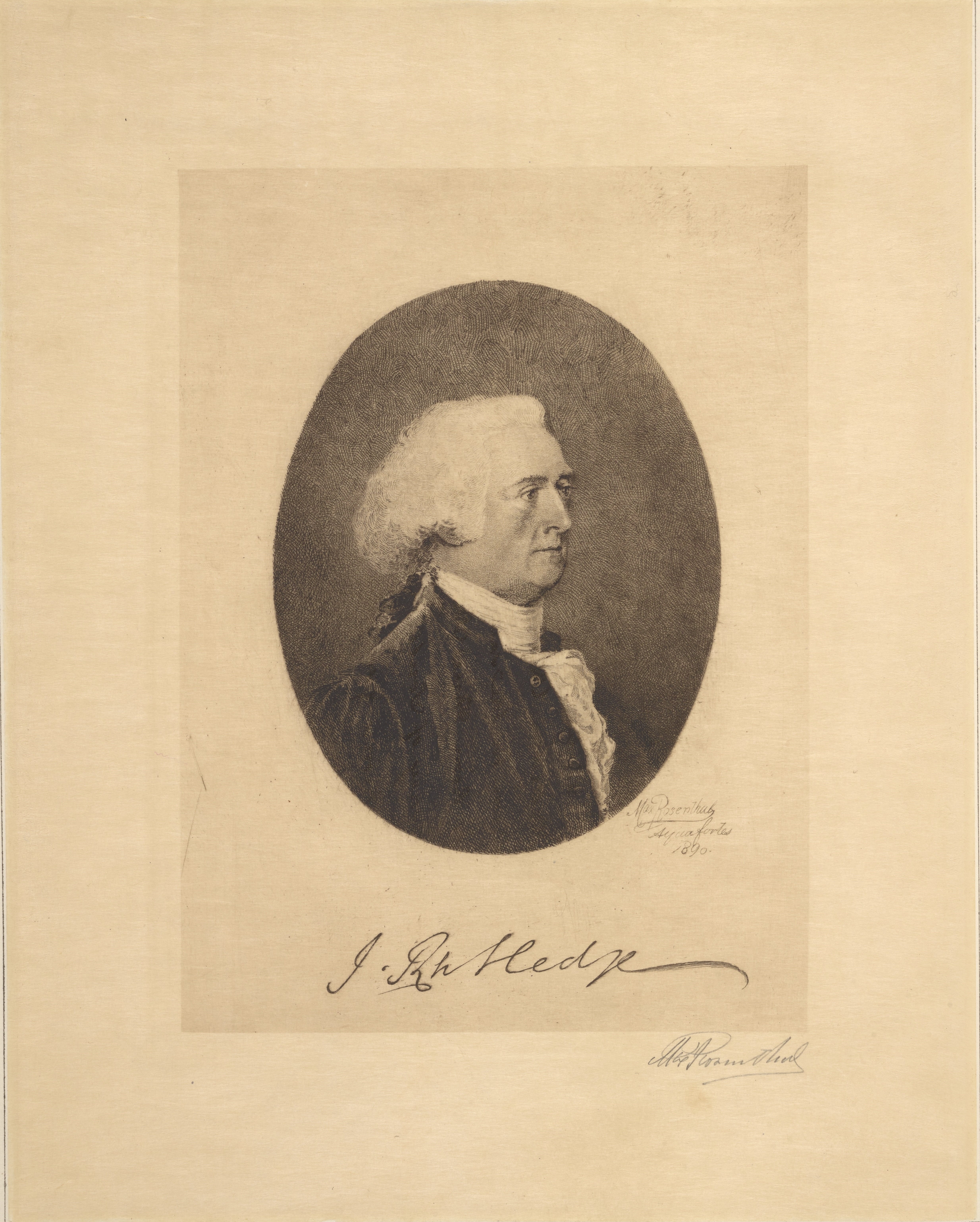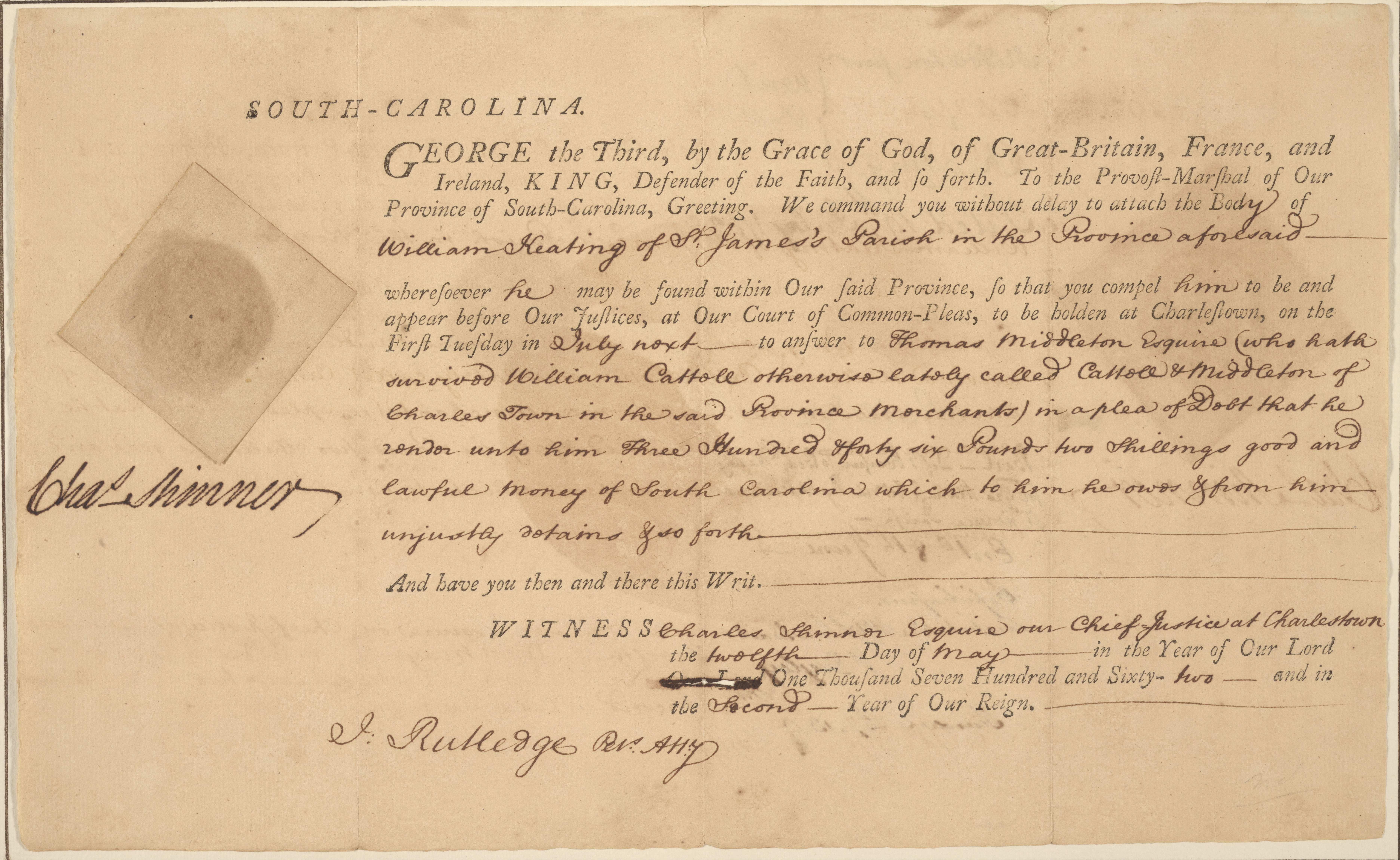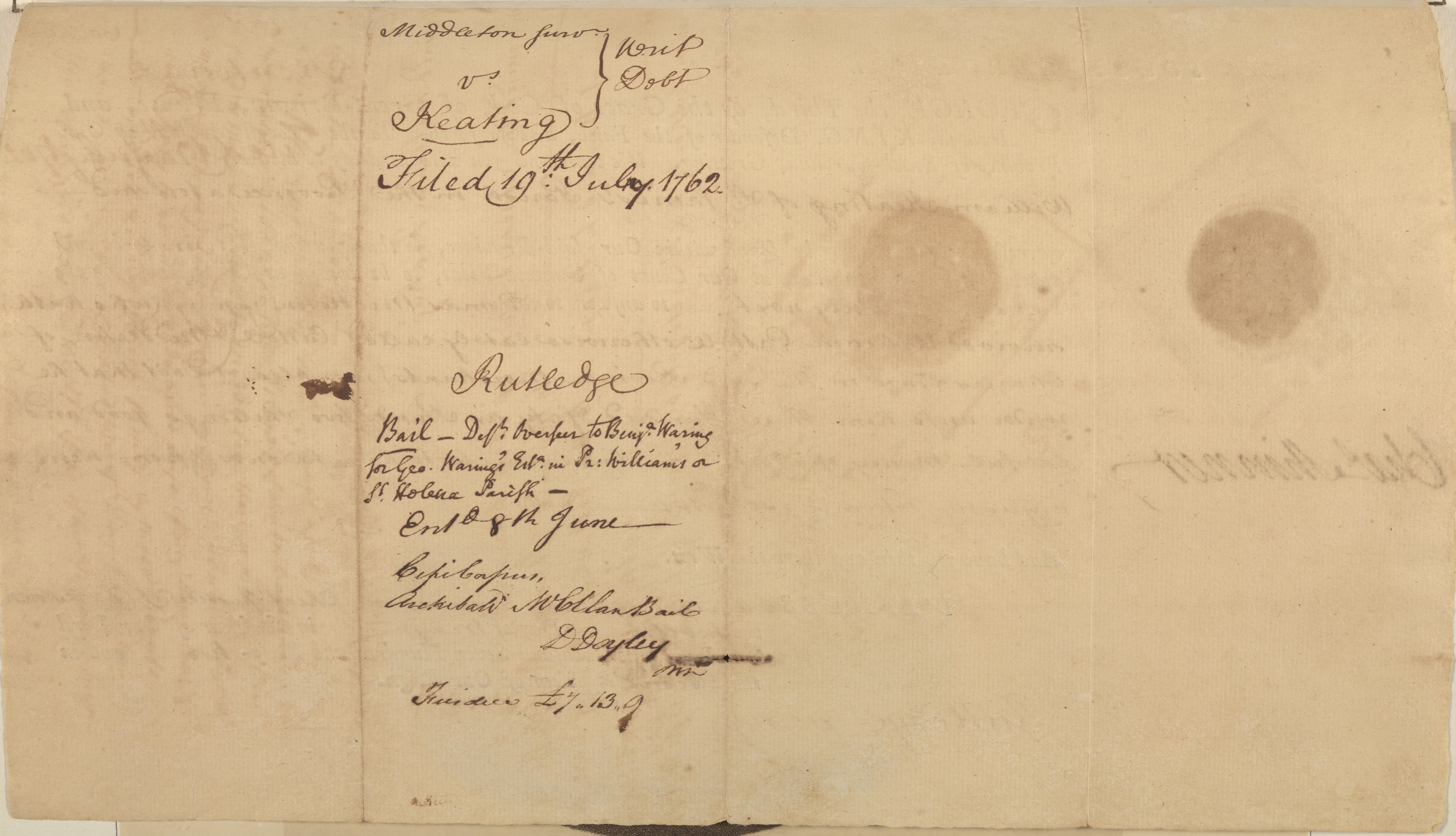John Rutledge
John Rutledge (1739-1800) served as as Associate Justice of the United States Supreme Court from 1789 to 1791, and then served as the Chief Justice for about six months in 1795.
Portrait
Max Rosenthal, J. Rutledge, 1890, print: etching, United States Supreme Court: Portraits and Autographs, D'Angelo Law Library Rare Book Room, University of Chicago Library.
Signed by the artist, Max Rosenthal.
Signature
Detail from Writ from George the Third to the Provost-Marshal of South-Carolina, 12 May 1762, United States Supreme Court: Portraits and Autographs, D'Angelo Law Library Rare Book Room, University of Chicago Library.
The Document
Writ from George the Third to the Provost-Marshal of South-Carolina, 12 May 1762, United States Supreme Court: Portraits and Autographs, D'Angelo Law Library Rare Book Room, University of Chicago Library.
Transcription of the Writ:
SOUTH-CAROLINA.
GEORGE the Third, by the Grace of God, of Great-Britain, France, and Ireland, KING, Defender of the Faith, and so forth. To the Provost-Marshal of Our Province of South-Carolina, Greeting. We command you without delay to attach the Body of William Keating of St. James's Parish in the Province aforesaid wheresoever he may be found within Our said Province, so that you compel him to be and appear before Our Justices, at Our Court of Common-Pleas, to be holden at Charlestown, on the First Tuesday in July next to answer to Thomas Middleton Esquire (who hath survived William Cattell otherwise lately called Cattell & Middleton of Charles Town in the said Province merchants) in a plea of Debt that he render unto him Three Hundred & forty six Pounds two Shillings good and lawful money of South Carolina which to him he owes & from him unjustly retains & so forth.
And have you then and there this Writ.
WITNESS Charles Skinner Esquire our Chief Justice at Charlestown the twelfth Day of May in the Year of Our Lord One Thousand Seven Hundred and Sixty-two and in the Second Year of Our Reign.
J. Rutledge [Per.s] Att.y
[Signature on Left] Chas Skinner
Writ from George the Third to the Provost-Marshal of South-Carolina, 12 May 1762, United States Supreme Court: Portraits and Autographs, D'Angelo Law Library Rare Book Room, University of Chicago Library.
Transcription:
Middleton Surv.r
vs. } Writ Debt
Keating
Filed 19th July 1762
Rutledge
Bail - [Def.t] Oversees to Benj. Waring [for ?] Waring's [Est. in ?]: Williams or St. Helena Parish-
Ent. 8th June
[?]
Archibald [?] Bail
D. Doyley
[?]
[?] £ 4.13.9
About this Document
About Colonial South Carolina
In 1762 when this writ was issued, South Carolina was a British colony under the rule of King George III. At the time of his involvement with this legal action, John Rutledge was an attorney in private practice and also a member of the South Carolina Commons House of Assembly.
For more about the South Carolina House of Assembly and South Carolina as a British Colony, see:
- Jack P. Greene, The Quest for Power: The Lower Houses of Assembly in the Southern Royal Colonies, 1689-1776 (Chapel Hill, NC: University of North Carolina Press, 1963).
- House of Representatives of South Carolina, Journals of the Commons House of Assembly.
- This online resource contains the Journals of the Commons House of Assembly from 1692-1832.
- David Duncan Wallace, Constitutional History of South Carolina from 1725 to 1775 (Abbeville, S.C.: H. Wilson, printer, 1899).
- William Roy Smith, South Carolina as a Royal Province 1719-1776 (Freeport, N.Y.: Books for Libraries Press, 1970).
- Edward McCrady, The History of South Carolina under the Royal Government, 1719-1776 (New York: Macmillan, 1899).
For more about South Carolina History generally, see:
- "South Carolina Historical Society," South Carolina Historical Society, accessed July 12, 2019, https://schistory.org/.
- Archives of and publications about South Carolina history, including family histories of many of the people mentioned in or on this writ.
- "Charleston Museum," The Charleston Museum, accessed July 12, 2019, https://www.charlestonmuseum.org/.
- Archives of Charleston history.
For more about the Legal History of Colonial America generally, see:
- Christopher L. Tomlins and Bruce H. Mann, eds., The Many Legalities of Early America (Williamsburg, Va.: Published for the Omohundro Institute of Early American History and Culture by the University of North Carolina Press, Chapel Hill, 2001).
- William E. Nelson, The Common Law in Colonial America (New York: Oxford University Press, 2008).
- Alison L. LaCroix, Drawing and Redrawing the Line: The Pre-Revolutionary Origins of Federal Ideas of Sovereignty (Chicago: University of Chicago Law School, 2008).
- Sandy Costa and Matthew Fitch, eds., The Legal Foundation of the Thirteen Original American Colonies (West Hartford, CT: The Graduate Group, 2008).
- Adam Wolkoff, The Political and Legal Structures of the Thirteen Colonies Prior to the American Revolution (West Hartford, CT: The Graduate Group, 2008).
- Olia Yelner, Outstanding Judges in the Thirteen Colonies (West Hartford, CT: Graduate Group, 2008).
About John Rutledge
John Rutledge was very active in public life in South Carolina, serving in various legislative positions and then as the first governor of South Carolina. He was also involved in national politics: he served as a South Carolina delegate to both Continental Congresses, a delegate to the Federal Constitutional Convention, and was a member of the South Carolina convention to ratify the Constitution.
John Rutledge was nominated to the Unites States Supreme Court by George Washington in 1789 and he served as an Associate Justice until his resignation in 1791 to serve as the Chief Justice of the South Carolina Court of Common Pleas. After John Jay's resignation from the Court, Washington appointed Rutledge to serve as Chief Justice in July of 1795 and nominated him for the position in December, but the Senate voted not to confirm the nomination (this rejection is generally attributed to Rutledge's opposition to the Jay Treaty) and he resigned as Chief Justice on December 28, 1795.
For more about John Rutledge's life and career, see:
- Follow this link to search the University of Chicago Library catalog for the subject heading "Rutledge, John, 1739-1800".
- "Founders Online," National Historical Publications & Records Commission, U.S. National Archives and Records Administration, accessed July 12, 2019, https://founders.archives.gov/.
- Contains letters to and from John Rutledge in the searchable papers of George Washington, Benjamin Franklin, John Adams, Thomas Jefferson, Alexander Hamilton, and James Madison (administered by the U.S. National Archives and Records Administration).
- "Rutledge, John," Federal Judicial Center, accessed July 12, 2019, https://www.fjc.gov/history/judges/rutledge-john.
- Lists background information on his professional career as well as a bibliography and list of manuscript collections.
- "RUTLEDGE, John (1739-1800)," Guide to Research Collections, Biographical Directory of the United States Congress, accessed July 12, 2019, http://bioguide.congress.gov/scripts/guidedisplay.pl?index=R000552.




